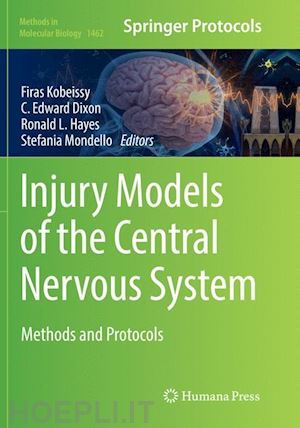
Questo prodotto usufruisce delle SPEDIZIONI GRATIS
selezionando l'opzione Corriere Veloce in fase di ordine.
Pagabile anche con Carta della cultura giovani e del merito, 18App Bonus Cultura e Carta del Docente
This volume discusses experimental brain injury models that contain valuable information carefully chosen to widen the researchers’ horizon about neurotrauma. Injury Models of Central Nervous System: Methods and Protocols contains relevant experimental design approaches that have been adapted and made ready for application in laboratory settings. For easier navigation, the chapters are categorized into 6 parts: Introduction, General Consideration in Using Animal Laboratory in CNS Injury Research, Classical TBI Models and Their Link with Pathophysiological Features of CBS Injury – Models, Special Topics in CNS Trauma: Comorbid Conditions in CNS Injury, Outcome Measures in Brain Injury Models, and Future Directions. Written in the highly successful Methods in Molecular Biology series format, chapters include introductions to their respective topics, lists of the necessary materials and reagents, step-by-step, readily reproducible laboratory protocols, and tips on troubleshooting and avoiding known pitfalls.
Practical and thorough, Injury Models of Central Nervous Systems: Methods and Protocols, is a very useful reference towards the progress of this discipline.
The History and Evolution of Experimental Traumatic Brain Injury Models.- Clinical Traumatic Brain Injury in the Preclinical Setting.- Rodent Models of Traumatic Brain Injury: Methods and Challenges.- Traumatic Brain Injury Models in Animals.- Systematic Review of Traumatic Brain Injury Animal Models.- Methods of Drug Delivery in Neurotrauma.- Bridging the Gap of Standardized Animals Models for Blast Neurotrauma: Methodology for Appropriate Experimental Testing.- Cellular Mechanisms and Behavioral Outcomes in Blast-Induced Neurotrauma: Comparing Experimental Set-Ups.- Application of Systems Biology to Neuroproteomics: The Path to Enhanced Theranostics for Traumatic Brain Injury.- Role of Systems Biology in Brain Injury Biomarker Discovery: A Neuroproteomic Application.- The Controlled Cortical Impact Model of Experimental Brain Trauma: Overview, Research Applications, and Protocol.- Weight Drop Models in Traumatic Brain Injury.- Midline (Central) Fluid Percussion Model of Traumatic Brain Injury.- Lateral (Parasagittal) Fluid Percussion Model of Brain Injury.- Impact Acceleration Model of Diffuse Traumatic Brain Injury.- Experimental Models for Neurotrauma Research.- A Porcine Model of Traumatic Brain Injury via Head Rotational Acceleration.- Pediatric Rodent Models of Traumatic Brain Injury.- Modeling Pediatric Brain Trauma: Piglet Model of Controlled Cortical Impact.- Thromboembolic Model of Cerebral Ischemia and Reperfusion in Mice.- Animal Stroke Model: Ischemia/Reperfusion and Intracerebral Hemorrhage.- Combined Neurotrauma Models: Experimental Models Combining Traumatic Brain Injury and Secondary Insults.- Microdialysis as Clinical Evaluation of Therapeutic Hypothermia in Rat Subdural Hematoma Model.- Repetitive Transcranial Magnetic Stimulation as a Novel Therapy in Animal Models of Traumatic Brain Injury.- Experimental Models Combining TBI, Hemorrhagic Shock, and Hypoxemia.- Experimental Models Combining Traumatic Brain Injury and Hypoxia.- Animal Models of Post-Traumatic Seizures and Epilepsy.- Closed-Head TBI Model of Multiple-Morbidity.- Cognitive Evaluation Using Morris Water Maze in Neurotrauma.- Assessment of Cognitive Function in the Water Maze Task: Maximizing Data Collection and Analysis in Animal Models of Brain Injury.- Detecting Behavioral Deficits Post Traumatic Brain Injury in Rats.- Advanced and High Throughput Method for Mitochondrial Bioenergetics Evaluation in Neurotrauma.- Determination of Vascular Reactivity of Middle Cerebral Arteries from Stroke and Spinal Cord Injury Animal Models Using Pressure Myography.- Assessment of Basilar Artery Reactivity in Stroke and Subarachnoid Hemorrhage Using Wire Myograph.- Magnetic Resonance Imaging in Experimental Traumatic Brain Injury.- A Simplified Workflow for Protein Quantitation of Rat Brain Tissues Using Label-Free Proteomics and Spectral Counting.- Phenotypic Screening of Small-Molecule Inhibitors: Implications for Therapeutic Discovery and Drug Target Development in Traumatic Brain Injury.- Postnatal Neural Stem Cells in Treating Traumatic Brain Injury.- A Novel Biopsy Method for Isolating Neural Stem Cells from the Subventricular Zone of the Adult Rat Brain for Autologous Transplantation in CNS Injuries.- Challenging the Paradigms of Experimental TBI Models: From Preclinical to Clinical Practice.











Il sito utilizza cookie ed altri strumenti di tracciamento che raccolgono informazioni dal dispositivo dell’utente. Oltre ai cookie tecnici ed analitici aggregati, strettamente necessari per il funzionamento di questo sito web, previo consenso dell’utente possono essere installati cookie di profilazione e marketing e cookie dei social media. Cliccando su “Accetto tutti i cookie” saranno attivate tutte le categorie di cookie. Per accettare solo deterninate categorie di cookie, cliccare invece su “Impostazioni cookie”. Chiudendo il banner o continuando a navigare saranno installati solo cookie tecnici. Per maggiori dettagli, consultare la Cookie Policy.